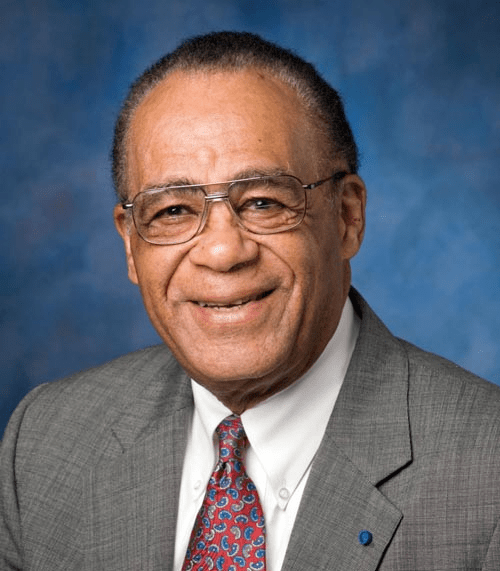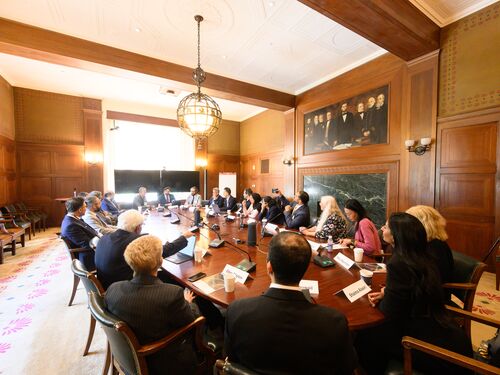‘We Must Let Opportunity Meet Talent’
Feature Story
By Molly Galvin
Last update October 15, 2020

John Brooks Slaughter Delivers Special Lecture on Racial Justice and Equity at 56th NAE Annual Meeting
John Brooks Slaughter has a long and accomplished record of achievements. Currently a professor at Rossier School of Education and Viterbi School of Engineering at the University of Southern California, Slaughter was the first Black director of the National Science Foundation, and the first Black president of Occidental College, as well as a chancellor of the University of Maryland. Slaughter’s distinguished career, however, was set against a backdrop of decades of systemic and structural racism.
“I have a vivid memory of the struggle for civil rights in this country,” said Slaughter, who delivered a special lecture on racial justice and equity at the National Academy of Engineering’s 2020 annual meeting. In his lifetime, he experienced “the tragic and violent deaths of Emmett Till, Medgar Evers, and Martin Luther King Jr., the Watts riots, the assassinations of the Kennedys, and the turmoil over the Vietnam War. I was a member of the commission chaired by Warren Christopher to investigate the use of force in the Los Angeles police department in the wake of the Rodney King beating, and I know the fear that Black people have who are stopped and interrogated by police officers.” And this year, Americans are living through one of the most crucial periods in the history our nation, he said, and are facing several critical and potentially cataclysmic events at once. The first is global climate change, which threatens “the very survival and existence of our species and all other animal and plant species on Earth. The second threat is the novel pandemic, which has the power to imperil our lives and dramatically change the way we live, work, and interact with one another. And the third … is the one that jeopardizes our democracy, productivity, and well-being. That is the crisis caused by the ignominious history of racism and anti-Blackness — the unwillingness to acknowledge and accept the humanity of Black people — that has crippled our nation for 400 years.
Our very survival depends upon preparing and marshaling all the talent we can possibly develop.
“A common thread that runs through each of these monstrous and intractable problems is the fact that engineers have a role to play in identifying and developing answers for their solutions,” said Slaughter. “Our very survival depends upon preparing and marshaling all the talent we can possibly develop. If we were to eliminate the systemic racial inequities that crush the aspirations and potentialities of so many Black Americans, our nation would not only be more just and equitable, but it would also have an even greater capacity for innovation and productivity. We must let opportunity meet talent.”
Slaughter said the “broad, demonstrative, multiracial, and multicultural reaction” to the senseless murders of George Floyd, Breonna Taylor, and Eric Garner at the hands of police has prompted a wide range of institutions to pledge to remove systemic and structural barriers to diversity and inclusion, both within their own organizations and in the larger society.
“All of these are extremely encouraging developments, because for far too long, many of the institutions and organizations that are now on board have been on the periphery of racial justice movements and have at most provided rhetoric, but little in the way of action in addressing the inequities, discrimination, and implicit biases that exist and persist in their midst,” he said.
A cultural transformation in STEM fields is particularly needed, Slaughter emphasized. “We’re at a moment when the country can ill-afford to ignore the talent that exists in those persons who have been historically underrepresented, underrecognized, and underappreciated in science, technology, and engineering.” Slaughter identified several improvements that need to be made in engineering education and practice specifically, which lags behind other fields such as law and medicine when it comes to committing to and practicing racial and social justice.
According to the National Science Foundation, Slaughter said, studies suggest that more Black and brown K-12 students aspire to become engineers than their white peers, and yet only 4% of minority high school graduates have taken the requisite courses needed to enroll in engineering in college. There are many reasons for this, including the likelihood that minority students attend under-resourced schools in economically depressed areas, have fewer role models, and are discouraged by academic counselors and teachers from pursuing engineering.
“I know this from experience, because it happened to me and many like me in my generation,” said Slaughter. “That it occurred back then could be considered shameful. The fact that it continues today borders on the criminal.”
In higher education, Slaughter noted that because of demographic shifts, restrictions on immigration, and fewer international students enrolling in U.S. colleges and universities because of the pandemic, these institutions “must diversify their enrollees or ultimately close their doors.” In addition, “the dearth of Black, brown, and Indigenous persons on the faculties of our major research universities is higher education’s Achilles heel and its shame.” He said that to make real improvements, these institutions should collaborate with Historically Black Colleges and Universities and Hispanic-Serving Institutions, and be more proactive in efforts to recruit and retain diverse faculty.
Corporate America also has a major responsibility in ensuring that its structures and operations are free of discriminatory practices in hiring, promotion, and all employment procedures and policies — particularly in Silicon Valley and in many high-tech companies, “whose records of racial justice can only be described as failures,” said Slaughter. “They must come to understand their obligations in the effort to eliminate the digital divide, as well as the inequities inherent in the hardware and software they produce.” Corporations should provide more scholarships, internships, and summer employment opportunities to racial and ethnic minorities, but they should also provide sustained support to minority-serving nonprofit institutions such as the National Action Council for Minorities in Engineering and the National GEM Consortium.
Slaughter remarked that the NAE has a long record of involvement in efforts to increase the presence of underrepresented students in engineering. Most recently, NAE President John L. Anderson has appointed a committee on racial justice and equity in engineering, on which Slaughter serves.
[A] cultural transformation must take place within the engineering profession, including the NAE, if we are to provide a meaningful and sustainable contribution to the efforts to quell systemic and structural racism in engineering and in society.
“It is the belief of the committee that a cultural transformation must take place within the engineering profession, including the NAE, if we are to provide a meaningful and sustainable contribution to the efforts to quell systemic and structural racism in engineering and in society,” Slaughter said. “All of us must ask ourselves the hard question, ‘Am I doing enough to help the engineering profession?’
“I believe the events of the past few months … have opened a window of opportunity that we cannot afford to allow to close without making major strides in guiding the discipline [of] engineering toward becoming a more diverse, pluralistic, and inclusive profession.”



